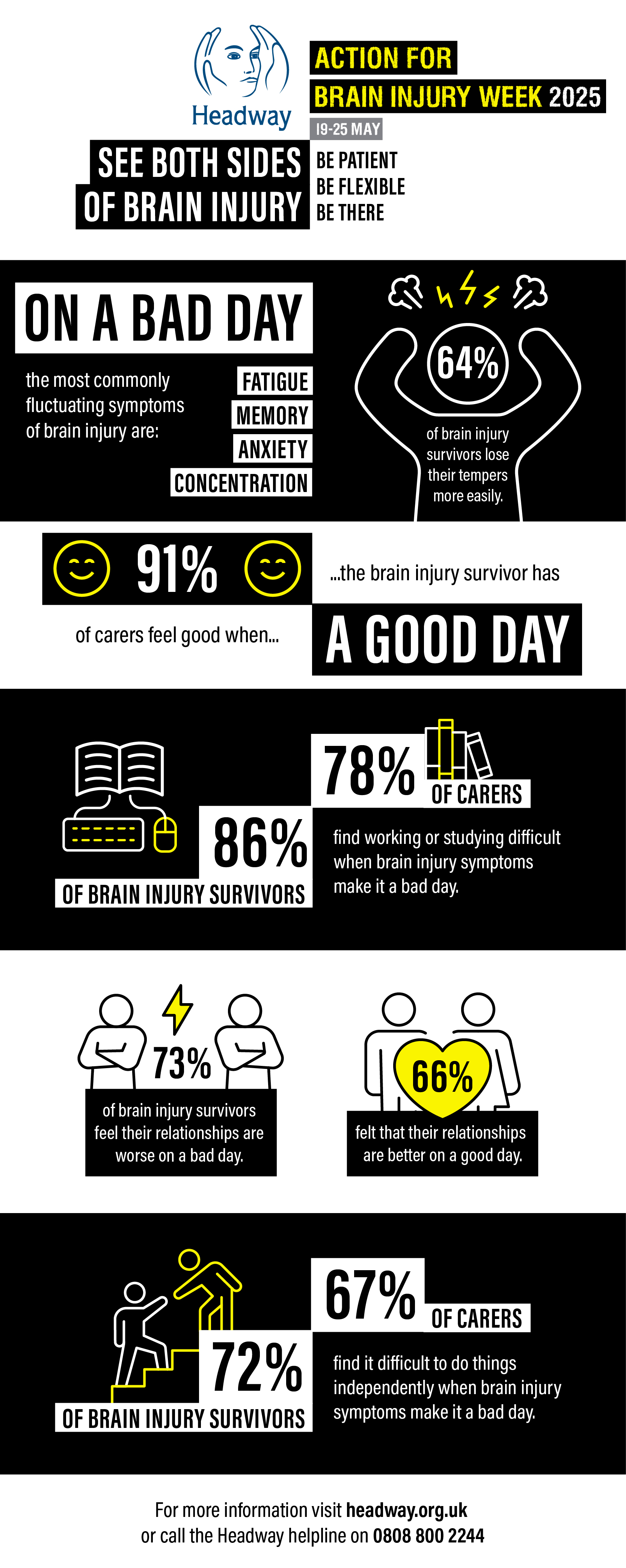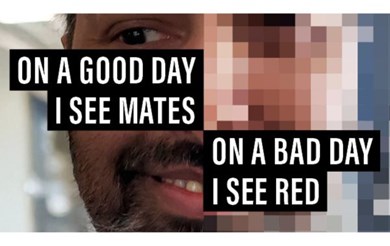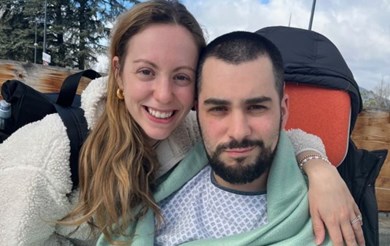On a good day

On a good day focuses on the hidden and fluctuating nature of brain injury
The impact of brain injury can be devastating and lifelong. Day to day, hour to hour, the symptoms of a brain injury can vary and change wildly.
On a good day, life can seem almost normal, but on a bad day, a brain injury survivor can experience a huge range of debilitating symptoms from severe fatigue, headaches, mood changes and cognitive issues, leaving them feeling isolated and having a huge impact on their relationships with friends, family and colleagues.
It’s all too easy to judge a brain injury survivor by their good days, without making any allowances for their bad days. But the fluctuating nature of brain injury symptoms makes life difficult and wildly unpredictable.
So, for this campaign, we’re telling both sides of the story.
See both sides of brain injury
We’re asking people to be more aware of the varied and fluctuating symptoms, and how different someone can feel and act from one day to the next.
We’re asking people to see both sides of brain injury. And to show compassion and understanding, and make allowances.
To be patient when they’re tired and their behaviour changes.
To be flexible when plans are cancelled last minute, because the world is too much to deal with.
And to be there for them when they need you – on the good days, and the bad.
Be patient. Be flexible. Be there
Explore the campaign:
- On a good day: Discover our newest campaign in action
- Survey results: The impact on people of the fluctuating nature of brain injury
- Fatigue after brain injury
- Memory problems after brain injury
- Anxiety after brain injury
- Minimising the bad days and ways to cope when they occur
- Support the campaign
- On a Good Day podcast
- Explore the campaign
On a good day: Discover our newest campaign in action
With 72% of brain injury survivors reporting that they find it difficult to do things independently when brain injury symptoms make it a bad day, share this video to raise awareness for people living with brain injury.
Survey results
At the core of this campaign is the report sharing our latest survey results. The surveys were designed to gather experiences from brain injury survivors and their carers on the fluctuating nature of brain injury. By fluctuating, we mean that the effects of brain injury are not the same every day. They may be ‘better’ on some days and ‘worse’ on others.
Key findings:


Fatigue after brain injury
Fatigue is an extreme tiredness and lack of energy.
We all feel tired sometimes, but fatigue after brain injury is something else entirely.
Unlike everyday tiredness that fades with rest, pathological fatigue can be constant, overwhelming, and unrelenting. It doesn’t always improve with sleep or downtime, and it can make even simple daily tasks feel impossible.
This kind of fatigue is one of the most common—and most misunderstood—effects of brain injury.
Find out more
Explore the sections on fatigue across our website to learn more about:
- What fatigue really is
- Why it happens after brain injury
- How to spot the signs
- Common triggers
- Practical ways to manage it
Need support?
Find out more in our publication Fatigue after brain injury (PDF).
For further information and support about living with the effects of brain injury, contact our nurse-led helpline.
Memory problems after brain injury
Memory is easily affected by brain injury because there are several structures within the brain that are involved in memory, and injury to any of these parts can impair memory performance. As remembering involves the stages of taking in information, storing it adequately and retrieving it when needed, injury to those parts of the brain responsible for these stages can lead to poor memory.
Find out more
Explore the sections on memory across our website to learn more about:
- What is memory?
- What is amnesia?
- Strategies for coping with memory problems
- Frequently asked questions about memory problems after brain injury
- More information on memory problems
Need support?
Find out more in our publication Memory problems after brain injury (PDF).
For further information and support about living with the effects of brain injury, contact our nurse-led helpline.
Anxiety after brain injury
After having a brain injury, people can experience a wide range of emotions, including anxiety. Anxiety is a common consequence of brain injury, and there are many reasons why someone may feel anxious after their injury. There are a range of symptoms associated with anxiety, from mild to severe, and it can interfere with various aspects of life such as relationships, employment and emotional well-being.
Find out more
Explore the sections on anxiety in our publication to learn more about:
- What is anxiety
- How a brain injury can cause anxiety
- Where to get professional help for anxiety after brain injury
- How to cope with anxiety after brain injury
- Anxiety in carers
Need support?
Find out more in our publication Anxiety after brain injury (PDF).
For further information and support about living with the effects of brain injury, contact our nurse-led helpline.
Minimising the bad days and ways to cope when they occur
Try these tips when you need some extra support on a bad day
- Reach out to others on a bad day. Talk about how you are feeling, ask for practical support, and do not feel that you have to get through the day on your own. You can speak to friends, family, or others who you have a good relationship with and who understand the impact of your brain injury. Our Headway support groups, helpline and online communities are available to you as well.
- Learn ways to cope with fatigue and other effects of brain injury.
- Try to get a good night’s sleep by learning about sleep hygiene and relaxation. Our publications on fatigue and sleep problems after brain injury both contain guidance on this, as well as our webinar on sleep after brain injury, available on our YouTube channel.
- Communicate with others if you are wanting to be left alone and have time to yourself. Doing this in a respectful way means that people will better understand why you may be minimising contact, helping to avoid social misunderstandings. You can consider using your Headway Brain Injury Identity Card to help with having this conversation.
- Find activities that are important and meaningful for you to do and complete these on your bad days if you are feeling able to.
- Enjoy nature by going for a walk, gardening, or even sitting by a window to enjoy the birdsong outside. Check out our webinar on this topic to find out more about how nature can help after brain injury.
- Keep things in perspective on bad days. Life can be challenging after brain injury, but remember how far you have come and all of the things that you have achieved through your recovery.
- Slow down on your bad days and allow yourself time to do things at a gentler pace.
Support the campaign
During ABI week, whether you're an individual or an organisation, we encourage you to highlight the subject of brain injury by sharing your support, your lived experience, and your fundraising events and activities across email and social media.
We have put together this digital toolkit where you can access everything you need!
Keep the conversation going
Whether you're living with a brain injury, caring for someone who is, or working on the front lines—your voice matters. Share your story. Use our resources. Help others understand what life after brain injury really looks like.
Share your story. Start a conversation. Support someone on their journey.
Explore our ongoing resources and find out how you can stay involved.
1. Share Your Story
We’d love you to share your own On a Good Day stories on social media, tagging @HeadwayUK and #OnAGoodDay — whether through writing, video, or audio. Adding your voice could help others feel less alone and provide real-life insights into the fluctuating nature of brain injury. Let’s build a community of shared experiences together.
2. Take action
You can support the On a good day campaign by:
- Writing to your MP about brain injury support.
- Sharing the campaign materials on social media.
- Hosting an event in your community.
3. Connect with Headway
If you’ve had a good day – or a bad one – we’re here
Every day with a brain injury is different. That’s why Headway is here—not just on the good days, but especially on the hard ones.
We’re the UK-wide charity dedicated to improving life after brain injury, offering support that helps people move forward, one day at a time:
Find the right support for you
- You can find a wide range of local brain injury support and services in your area
- For further information and support on how to support someone with a brain injury, contact our nurse-led helpline: 0808 800 2244 or email helpline@headway.org.uk
- Headway Brain Injury Identity Card helps you explain your condition in everyday situations and when interacting with the criminal justice system
- Headway Emergency Fund provides financial help when it’s needed most
- Our award-winning website is packed with factsheets, guides, and resources to help you understand and manage brain injury
- From coping strategies to legal advice, our publications are designed to support survivors, carers, and professionals alike
- Find trusted residential homes, rehab units, and respite services tailored to brain injury needs in our specialist directory.
On a Good Day podcast
On a Good Day is the podcast about brain injury and its impact on all involved, hosted by Elizabeth Callaghan and Julia Ajayi. We'd like to thank Elizabeth and Julia for sharing the 'On a good day name', and encourage you to have a listen!
Explore the campaign
Lorna's story On a good day
As part of Headway's Action for Brain Injury (ABI) Week 2025 On a good day campaign, Lorna shares her experience of how life changed after falling from her horse, aged 18.
Find out moreRaj's story On a good day
Doctors initially thought Raj Gataora wouldn’t eat, drink or even breathe by himself when he sustained a traumatic brain injury following a road crash in 2005.
Find out moreKatie's story On a good day
Katie Stratton was a happy, healthy mum-of-two when she was diagnosed with a brain tumour in 2019, aged 29.
Find out moreSupporting you
From local groups or branches, our Emergency Fund, Brain Injury Identity Card, helpline and much more, find out how Headway can support you after brain injury.
Find out moreBrain injury survey results
Explore the survey results during our Action for Brain Injury Week 2025 campaign. On a good day explores the fluctuating nature of brain injury and aims to improve society’s understanding of how it ca...
Find out moreFatigue
For many people after brain injury, fatigue may feel like overwhelming tiredness, which makes them unable to complete normal activities of daily living.
Find out moreMemory problems
Memory is easily affected by brain injury because there are several structures within the brain that are involved in memory, and injury to any of these parts can impair memory performance.
Find out moreManaging anxiety after brain injury
Find out moreAdapting to life after brain injury: Returning to work
This feature answers some common questions about returning to work after a brain injury.
Find out moreEffects of brain injury
Find out about some of the main difficulties that arise after brain injury, together with some suggestions as to how to deal with them.
Find out moreTypes of brain injury
Find out about the different causes of brain injury, such as trauma, stroke, viral infection and loss of oxygen to the brain
Find out moreBrain Injury Identity Card
Our Brain Injury Identity Card provides survivors with added confidence in social situations, while helping them to get the right support if they come into contact with the criminal justice system.
Find out moreHelpline
The Headway helpline is a free, confidential service available to anyone with a question about brain injury - from survivors and carers to students and professionals.
Find out moreDonate
Every donation to Headway makes a difference. Your gift will help ensure brain injury survivors, their loved ones and carers, don’t have to face an uncertain future alone.
Find out more











